4/1/2020
Developing Skilled Labor, One Intern at a Time
Julie Martens Forney
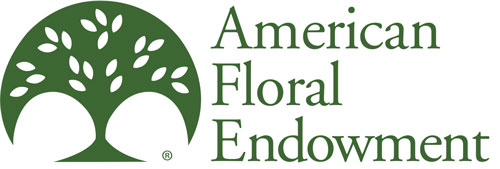
Labor currently ranks as the No. 1 worry for growers and florists alike. Finding labor in an economy with low unemployment rates is challenging enough, but when you add in immigration issues, a smaller labor pool and competing industries like cannabis growing, recruiting workers becomes even tougher.
The good news is that you’re not alone as you ponder your labor situation. You have the American Floral Endowment (AFE) in your corner, quietly helping to develop skilled horticulture workers by annually funding over 25 university student scholarships and three separate internship programs. AFE-sponsored internship programs help train students in areas of plant production, business, and floral retail, wholesale or allied trades.
Students who participate in AFE internships offer a unique opportunity for the industry.
“Those interns become a potential pipeline of future employees with valuable hands-on experience,” said Dr. Kimberly Williams, Kansas State University.
A horticulture teacher and advisor, she sees firsthand the benefits that internships bring—to host businesses and students alike.
“The students get a chance to connect classroom education to real world, hands-on experience,” Kimberly said. “Businesses find a skilled, motivated worker and often extend job offers to interns.”
How an internship works
The three AFE-sponsored internship programs allow students to get on-the-job training for three to six months prior to graduation. The program supplements a paid internship position with a monetary scholarship awarded at the completion of the internship.
“The AFE internship program is so awesome because you’re getting interns that are passionate about the industry who have been vetted,” said Ann Pennington, HR Manager of Neal Mast Greenhouses. “The students in the scholarship program are motivated to do well. We have had a great experience with every intern we’ve had through the program.”
What a student actually does during the internship varies based on the business and the student’s interest. Typically, operations take interns through their standard new employee training.
“We also assign a mentor to take the intern on a local tour, show them where to shop, take them to lunch on their first day and generally get them situated,” said Kathy McGinty, HR Manager at North Creek Nurseries. “We want them to feel welcome and looked after.”
Most of the operations expose interns to every aspect of their business.
“We rotate students through all operations at the nursery, with the understanding that they can ask for additional time in an area they would like to learn more about,” Kathy explained. “AFE interns are eager to learn and take full advantage of this opportunity. Last year, our intern even spent time with our office staff, learning about customer service, human resources, accounting and what it takes to keep our business financially operating.”
At North Creek, each intern is assigned a project that contributes to the business, such as designing a planting or solving a production issue.
“When the interns meet with me, I share our strategic plan, our mission and values, and our financial/sales goals,” added Tim McGinty, North Creek General Manager and COO.
Jacob Schwab, currently a Master’s student at Kansas State, interned at Tagawa Greenhouses in Brighton, Colorado.
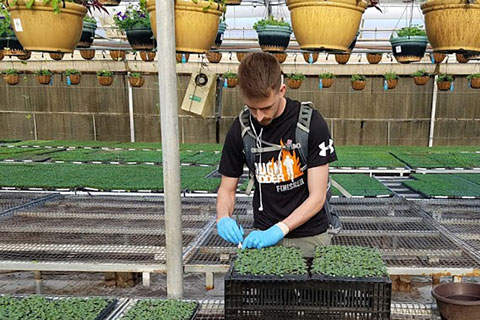 Pictured left: At Tagawa Greenhouses, Jacob Schwab fixes unseeded holes in flats to improve quality and ensure 100% seeding coverage.
Pictured left: At Tagawa Greenhouses, Jacob Schwab fixes unseeded holes in flats to improve quality and ensure 100% seeding coverage.
“One of my favorite things about Tagawa was how they open their books fully to you as an intern,” said Jacob. “You get to see all of the business sides and really understand why greenhouse production is viable and why it fails, when it fails.”
Plant production interns usually learn the role of section grower, learning how to grow a crop, but each business tailors the internship to reflect a student’s interest area.
“We’ve had some interns that took to the growing role so quickly that they received their own crop section to grow,” said Ann. “One intern was interested in sustainability, so they sat in with our sustainability committee to learn more about our sustainability initiatives and created a blog about it for a school project.”
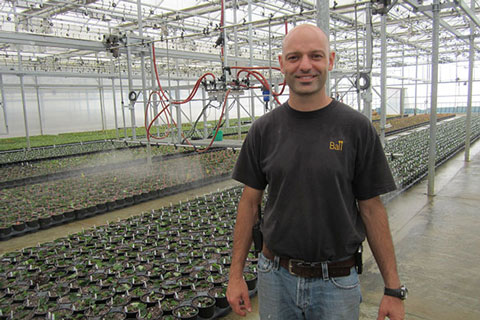 When Jason Twaddell interned at Metrolina Greenhouses, he already had five years of greenhouse production experience from his part-time job at a greenhouse in Kansas.
When Jason Twaddell interned at Metrolina Greenhouses, he already had five years of greenhouse production experience from his part-time job at a greenhouse in Kansas.
Pictured left: Jason Twaddell used his internship experience to help him land a job as a grower at a large greenhouse range.
“My goal was to be a grower in a big operation, so Metrolina devised an internship program where I was an assistant grower to one of their section growers for six months. I focused on growing and production—and I started on Day 1,” he said. Jason worked as a grower for 15 years after graduating. Today, he’s Sales and Marketing Manager for Ball FloraPlant.
Whether the internship places students in an office or a production or retail setting, the outcome is practical experience. Christy Staven, owner of May Flowers in Chattanooga, Tennessee, graduated from Mississippi State with a horticulture degree and a concentration in floral management. She interned at Grafe Studio, a mom-and-pop flower shop in Chattanooga. During her internship, she worked side by side with the 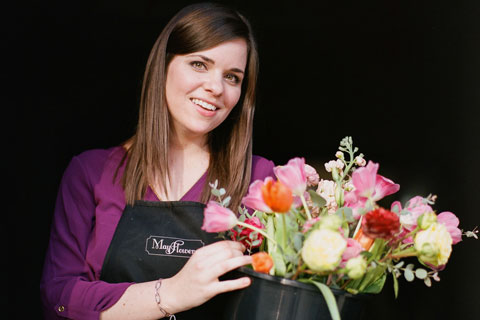 owners, learning “the inner workings of a florist. I was glad to have a paying, working opportunity to learn about the industry in a hands-on experience—and be introduced to the city that I now call home,” she said.
owners, learning “the inner workings of a florist. I was glad to have a paying, working opportunity to learn about the industry in a hands-on experience—and be introduced to the city that I now call home,” she said.
Pictured right: An internship in a retail flower shop helped Christy Staven embrace the entrepreneurial goal of opening her own wedding flower shop, May Flowers.
Helping students grow
Everyone wins when an intern arrives on the scene. For students, the obvious win is real-world experience, but other benefits run much deeper.
“I was most surprised with the amount of independent work I was allowed to do,” said Amanda Pieper, a December 2019 Utah State University grad with a degree in plant science. She interned at Green Circle Growers in Oberlin, Ohio.
“My grower supervisor would teach me the basics of plant care in my section and then leave me to do a lot of jobs on my own,” said Amanda. “That helped me gain skills and handle problem solving, which built my confidence.”
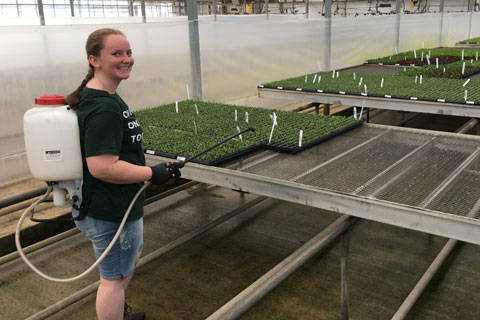 Pictured left: Intern Amanda Pieper sprays fungicide on seedlings. “Getting hands-on experience was a determining factor in knowing what I want to do for a career,” she said.
Pictured left: Intern Amanda Pieper sprays fungicide on seedlings. “Getting hands-on experience was a determining factor in knowing what I want to do for a career,” she said.
For many interns, the experience helps focus career goals.
“The internship helped me understand that I wanted my career to be around greenhouse production, but not necessarily as a grower,” Jacob said. “It pushed me toward teaching greenhouse management and greenhouse production as a profession to help train the next generation of growers.”
Christy shares similar sentiments. “Working in the flower shop helped refine my goals and spurred me to work toward entrepreneurship. I made important industry contacts, such as the local wholesalers and wedding planners, which helped me when I opened my own shop a couple years later.”
Syndicate Sales, Inc., a leading supplier and producer of floral industry supplies, has hosted business interns. The business program at AFE is focused on positions in marketing, IT, human resources and any other area of general business.
“Our industry needs top talent in these types of business positions,” said Laura Shinall, President of Syndicate Sales. “Communicating all of the viable career opportunities in our industry is vital to the future success of our industry.”
Interns make a difference
Host organizations also gain from hosting interns. Sometimes the return is immediate, like a solved problem. During her internship, Amanda helped improve irrigation efficiency by rigging a watering boom to deliver more water to 4.5-in. mums on the edges of benches, where pots are prone to drying.
At North Creek Nurseries, Kathy advised interns to be a “fresh set of eyes while they’re here. They’re mindful when performing tasks, ask great questions and come up with ways to make a process more lean, a concept we talk about all the time here. We’ve made several improvements to processes as a direct result of intern comments.”
Interns often tackle a short-term project that an operation might not be able to do otherwise.
“It’s important not to underestimate how an intern can add to a business,” Kimberly said. “One owner told me that the different department heads would fight over getting to work with their intern on the walkie-talkie each morning. Having that extra set of skilled hands can make a big difference.”
Ann suggests that smaller growers consider hosting interns as a solution to seasonal labor needs.
“Interns want to hit the ground running,” she said. “What you get back is far more than what it might cost you.”
A long-term gain is creating a skilled labor pool. “Internships help students understand what opportunities are out there,” Jason said. “We need to get people experience before they graduate and get into a job. Metrolina did such a great job of that. They should be applauded.”
Ways to get involved
Hosting an intern is an obvious way to participate in AFE’s programs. “It isn’t terribly expensive,” Ann said. “We’re paying an hourly wage, along with upkeep of a home on-site where we provide housing for the interns.”
Housing is the greatest challenge when hosting interns. “It’s often hard for students to find short-term housing,” Kimberly said. “Anything a business can do to help with that makes a huge difference.”
At North Creek one year, an employee’s mother rented a room to an intern. They recently completed renovation of tenant housing on-site for a rental situation.
“We strive for a balance between learning and working—justifying the expense of paying for the intern,” Tim said. “Although it is an expense, we feel it is our way to contribute to horticulture’s future leaders.”
Ann agrees. “The internship program definitely helps with producing skilled labor. I wish there were more programs like this. I’d like there to be more interns, too.”
While an internship program won’t solve every grower’s labor problem, it has the potential to create a group of top-tier talent with real skills.
Tim agreed, saying, “Because of the AFE screening process, the candidates that come through tend to fulfill future leadership roles in the industry.”
To learn more about AFE’s internship programs, visit endowment.org/internships/ or reach out to Debi Chedester, AFE’s Executive Director, at dchedester@afeendowment.org. GT
Julie Martens Forney is a freelance writer with more than 25 years of experience writing about floriculture industry issues and gardening for consumers. To read her current bylines, check out SAF’s Floral Management, HGTV.com and DIYNetwork.com. Julie’s also an avid gardener, tending edibles and perennials in a wildlife-friendly garden that features year-round color.